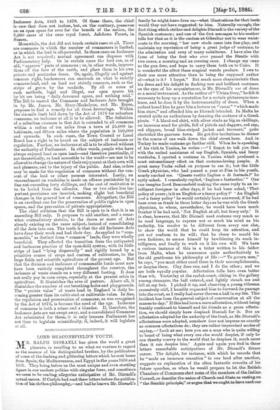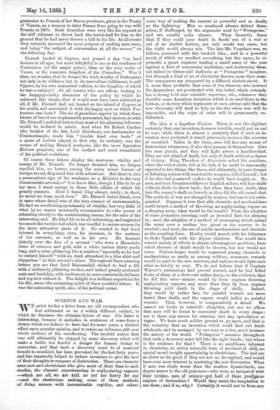LORD BEICONSE1ELD'S YOUTH.
MR. RALPH DISRAELI has given the world a great pleasure, in recalling to us whatwe venture-to regard as the essence of his distinguished brother, by the publication of some of the dashing an&glittering letters which hesent home from Spain, the Mediterranean, and Egypt bathe years.1830 and 1831. They bringhefore us the most unique and even startling figure in our modern politics with singular force, and sometimesweseens to be reading allegoriesanticipative of Mr. Disraeli's actual career. If Carlyle had read these letters before the publicee Mon of his clothes-philosophy,—and hadhe known Mr. Disraeli's family' e might.hasre-done so,—what illustratioreeforthat .book, would they not:have suggestedto hint Naturally enough,. the first thing. which strikeaand delights Disraeli is the-vssiety of the' Spanish costumes; and one of the first messages to hiamother tells herthat.as it is-the-custom at Gibraltar -not to wear waistcoats in the morning, "her new, studs came into fine-play; and maintain.my repntation: of' being, a great judge -of costume; to the admiration and envy ofmany subalterns. I have-also the' fame of being the firstwho ever passed the Straits with two canes, a morning-and an evening cane. I change my cane' as the gun fires, and hope to carry themboth onto Cairo. It' is wonderful the effect these magical wands produce. I owe to their use more attentionthan to being the supposed author of—what-is it ? I forget." But much more characteristic than. his dress and his delight in flashing new and brilliant costumes on the eyes of his acquaintances, is Mr. Disraeli's use of dress as a moral instrument. As the author of" Vivian Grey," he felt it necessary to keep up a reputation for a certain picturesque insolence, and he does it.by the instrumentality of dress. When a pedant bored him he gave him alecture on "canes" " which.made him stare," and offended him as Disraeli intended. In Malta he. created quite an enthusiasm by donning the costume of a-Greek pirate. "A. blood-red shirt, with silver studs as big as.
an immense scarf for girdle, full of pistols. and daggers, -red cap, red slippers, broad blue-striped jacket.. and, trowsers," quite electrified.the garrison town. He gotfive invitations-to dinner in .the coarse of one walk. down the chief street,here. And in Turkey he made,costume, go further-still. When he is-speaking of his visitto Yanina, he writes :—"I forget, to tell you. that with.the united. assistance of my-Englials, Spanish, and fancy' wardrobe,, I. sported. a costume in. Yanina. which produced a moat. extraordinary: effect on. that costume-loving, people. A! great many. Turks called. on purpose to see it.; but thelittle Greek physician, who had: passed a year at Pisa in his . youth, nearly-smoked me. Quest° vestito Inglese o di fantasia?' he aptly-aaked. I oracularly: replied, Inglesee fantastico.' " One, can imagine Lord Beaconsfieldmakingthe same reply 'to anin,telligent foreigner in after days, if he hadbeen asked, 'That' policy of yours; is it an Englishoralancy policy ?' AnEnglisk and a fancy policy' he woul&certainly-have answered, ifhe had been evenas frank in 'those latter days-as he was with the-Greek physician, to whom, nevertheless, he would have been much franker if he had said, 'Not English at all, but fancy only.' It . is clear, however, that MF Disraeli used costume very much as he used language, to express not so much his: mind as. his audacity, his resolve to be different from_ every one else, to show the world that he could keep its attention, and. yet not conform to its will ; that he chose to mould his own fashions, to amuse himself by bewildering its weak intelligence, and finally to work on it his own will. We have a curious instance of this in a letter written to his, father, from Malta, when he announces quite authoritatively to the old gentleman his philosophy of life :—" To govern men," he says, "you must either excel them in their accomplishments,. or despise them. Clay does one, and I do the other.;. and we are both equally popular. Affectation tells. here even., better.' than wit. Yesterday at the racket,court sitting in_ the. galleryamong strangers, the ball entered,and lightly struck me and fell at. my. feet. I picked-it unread observing a young rifleman. excessively: stiff, .I humbly-requested him: to forward..its passage into the court, as I really-had never thrown a.ball in my.life. This incidenthase been the-peer:al subject of conversation at all. the m eases -to-day." Ifthis ha& been a. mere affeotation, without being frankly confessato himself. and his friends as a gross affectation, we.should simply have despised. Disraeli for it. Brit an affectation adopted for the audacity of the freak, as .Mr. Disraeli's • affectations. were adopted, somehow does not impress= usexactly as common affectations do ; they' are: ratherimprovised modes-of saying,—' Look-nt me; here you see a man who is quite willing to boast ofbeing what every one else would despise, ifonly-he' can thereby. convey to the world that he:despises it, muchmore than it can despise him? Again and again you findin these letters remarkable anticipations of Mt. Disraeli's future career. The delight, for instance, with which he records. that he "made an immense sensation" in one land after another, suggests an explanation of the often fantastic conceits of his future speeches, as when he would propose to. let the British, Chambers of Commerce elect some of the members of the Indian. Council, or describe the. union of Church and State as resting on "the Semitic prineiple,'.' or argue that waought,to have used our guarantee to _Prussia of her -Saxon provinces, ,given in the Treaty of Vienna,as a weapon to deter France from going to war with Prussia in 1870. Such flourishes were very.like 11S request to theatiff rifleman to throw back the tennis-hall-for him on the ground that he had never-thrown a ball in his life. Atall events they certainly answered the same purpose of making men stare, and being "the -subject of conversation at all the messes" on the following day.
Disraeli landed at Cyprus, and passed a day "on laud famous in all ages, but more delightful to me as the residence of Fortunatus [of the magic purse], 'than as the -rosy realm of Venus, or the romantic kingdom of the Crusaders." Was it :then, we wonder, that he formed the wish,-worthy of Fcrrtunatus not .only in its wildness .bat in its marvellous fulfilment, to add Cyprus, by his own unassisted volition, to the kingdom of which he was a -su.bject ? At all events, who can affirm, looking .to the happy,go-lueky ohansoter of the .policy by which he achieved this .stroke, that it would ever have been achieved-eat all, if Mr. Disraeli had not lauded on the island of Cyprus.in his youth, and associated it with the happy spot on which Forinnatus was horn ? The air ofgraadiose caprice by which these letters of travel are so:pleasantly permeated, bad moreto do with .Mr. Disraeli's political future than most of his admiring followers would be -inclined to admit. And when Sir Robert Gordon (the brother of the late Lord Aberdeen), our Ambassador at :Constantinople, made him "tumble head over heels" at a game of forfeits played in -that .city, he certainly was the means of making Disraeli prefigure, like the more figurative _Hebrew prophets, one of the earliest ,and most remarkable of his political evolutions.
Of course these letters display the enormous vitality and energy of 'Mr. Disraeli. No danger daunted him, no fatigue repelled him, no horror, among the many minor horrors of foreign travel, disgusted him with adventure. Bat there is also .a premonitory .sign of his weakness as a Minister in the very characteristic avowal,—" You know that, though I like to be at my .ease, avant energy in those little affairs of which life greatly consists. Here I 'found Clay always ready; in short, he saved .me from much bore." Mr..Disra.eli hated detail, even in cases where detail was of the very essence of statesmanship. He had an overflowingspontaneity of-vitality, Ent very little of what by no means necessarily accompanies it, —the power of attending.closely to.the uninteresting means,lor.the sake of the interesting end. He liked life to be all interesting, and neglected too much the routine toil which was needful to secure success for the 'more attractive parts of it. He wanted to find fresh interest in everything, even, :for instance, in the costume of -his servants, as well as in his awn. He laments bitterly over -the loss of a servant "who wore a Ifameluke dress of crimson and gold, with a white turban thirty yards long, and a.sabre glittering like a-rainbow," especially-as he had to content himself "with an Arab attendant in a blue shirt and slipperless " in that servant's.place. -Throughout these amusing letters you see that Lord Beaconafield -wished to lead a life with a uniformly glittering surface,and indeed greatly preferred pain and hardship, with excitement, to mere comfortable dullness and jog-trot withoutit. The delight in abrilliant superficies for his life, seems the animating-spirit of these youthful letters. It .via.s.the animating spirit, also, of his-political career.



































 Previous page
Previous page